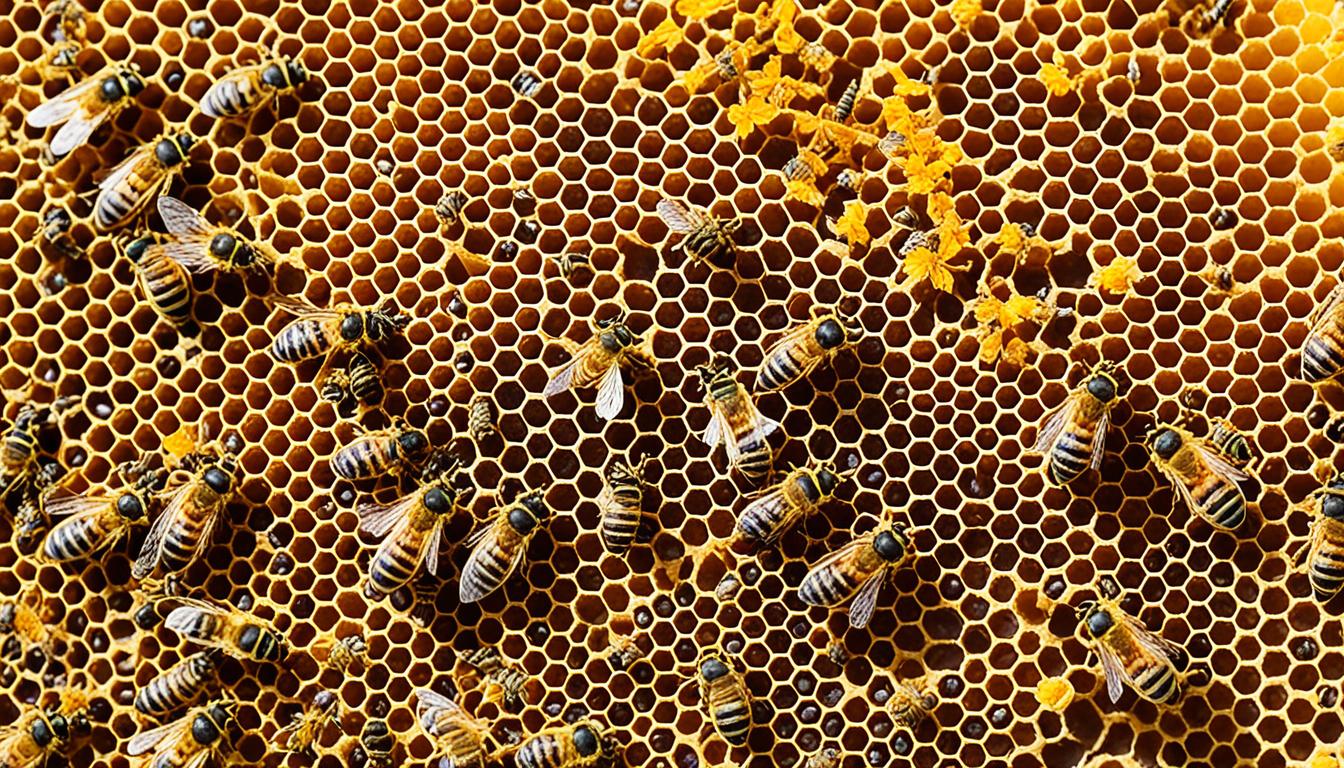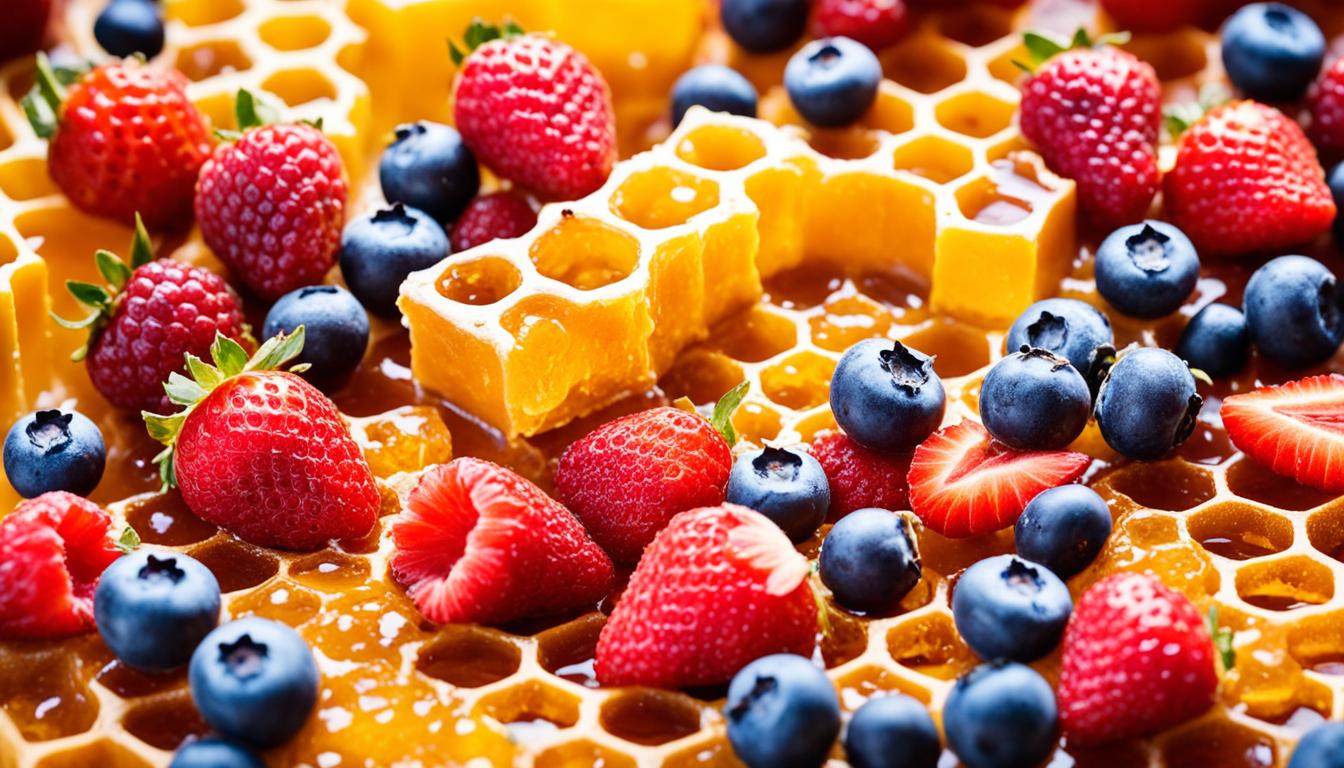Did you know that manuka honey, created by bees that pollinate the native leptospermum scoparium bush in Australia and New Zealand, is renowned for its natural antibacterial properties? This unique type of honey contains an active ingredient called methylglyoxal (MGO), which provides it with potent antimicrobial effects. With its potential health and wellness benefits, manuka honey has been utilized for centuries to address a variety of conditions. Join us as we explore the surprising benefits of manuka honey and learn how it can improve your overall well-being.
Key Takeaways:
- Manuka honey is made by bees that feed on the leptospermum scoparium bush, and it contains a powerful antibacterial component called methylglyoxal (MGO).
- Manuka honey has been found to have anti-inflammatory properties, aid in wound healing, soothe coughs and sore throats, support digestive health, and potentially treat ulcers and acne.
- Its effectiveness is supported by limited medical research, and more studies are needed to fully understand its potential benefits.
- Manuka honey should be used under the guidance of a healthcare professional, as it is different from regular honey found in the pantry.
- Exercise caution if you have allergies or diabetes, and always consult healthcare professionals for personalized advice regarding the use of manuka honey.
The Antibacterial Properties of Manuka Honey
Manuka honey stands out from other types of honey due to its unique antibacterial properties. While most honeys possess antibacterial qualities through hydrogen peroxide, manuka honey contains additional antimicrobial components, specifically methylglyoxal (MGO). The conversion of dihydroxyacetone (DHA), a compound found in the nectar of manuka flowers, produces MGO. The concentration of MGO determines the strength of manuka honey’s antibacterial effect.
To assess the potency of manuka honey, experts use a rating called the Unique Manuka Factor (UMF™). This rating reflects the concentration of MGO, DHA, and leptosperin. A minimum UMF™ rating of 10+ is typically considered therapeutic. However, the medical significance and implications of these ratings are still undergoing scrutiny and further investigation.
Manuka honey’s antibacterial properties set it apart from other honey varieties, making it a compelling option for various health applications.
When compared to other honeys, manuka honey exhibits enhanced antibacterial qualities due to its additional antimicrobial components. The main component responsible for these properties is methylglyoxal (MGO). MGO is formed from the conversion of dihydroxyacetone (DHA), a compound found in the nectar of manuka flowers. The higher the concentration of MGO, the stronger the antibacterial effect of manuka honey.
A rating system known as the Unique Manuka Factor (UMF™) is used to measure the potency of manuka honey. The UMF™ rating takes into account the levels of MGO, DHA, and leptosperin present in the honey. A minimum UMF™ rating of 10+ is generally considered to have therapeutic value. However, the medical significance of these ratings is still being studied and remains uncertain.
Manuka honey’s antibacterial properties make it a popular choice for various health-related applications.
“Manuka honey contains additional antimicrobial components, such as methylglyoxal (MGO), which sets it apart from other honeys.”
“The Unique Manuka Factor (UMF™) rating measures the concentration of MGO, DHA, and leptosperin in manuka honey, providing insight into its potency.”
| Antibacterial Properties of Manuka Honey | Details |
|---|---|
| Methylglyoxal (MGO) | Unique antimicrobial component |
| Conversion of dihydroxyacetone (DHA) | Forms MGO |
| UMF™ Rating | Reflects concentration of MGO, DHA, and leptosperin |
| Minimum UMF™ 10+ | Considered therapeutic |
Manuka honey possesses unique antibacterial properties due to additional antimicrobial components like methylglyoxal (MGO). The concentration of MGO determines its antibacterial strength. The Unique Manuka Factor (UMF™) rating reflects the levels of MGO, DHA, and leptosperin in manuka honey.
Wound Healing Properties of Manuka Honey
When it comes to healing wounds, manuka honey has proven to be remarkably effective. Numerous studies have demonstrated its ability to enhance the healing process, promote tissue regeneration, and alleviate pain in individuals with burns. But that’s not all – manuka honey also offers unique properties that help fight infections caused by antibiotic-resistant strains, such as methicillin-resistant Staphylococcus aureus (MRSA).
When manuka honey is used for wound treatment, it is sterilized and prepared as a medical-grade dressing. This ensures that it is suitable for medical use and able to provide optimal healing benefits. It’s important to note that, just like with any medical treatment, manuka honey should only be used under the supervision of a healthcare professional to ensure proper application and monitoring of the wound healing process.
With its potent healing properties, manuka honey has the potential to revolutionize the way we approach wound care. Its natural antibacterial and anti-inflammatory effects make it an invaluable tool in promoting optimal wound healing and reducing the risk of infections. By harnessing the power of manuka honey, healthcare professionals can provide their patients with a safe and effective alternative in wound management.
Using Manuka Honey for Burns
Specifically, manuka honey has been shown to be particularly beneficial in the treatment of burns. Its ability to accelerate the healing process, reduce inflammation, and prevent infections makes it a valuable asset in burn care. The natural properties of manuka honey provide a protective barrier that aids in the healing of the damaged skin, while also offering relief from pain and discomfort. As a result, it has gained recognition as a promising alternative treatment for burns.
Fighting Infections with Manuka Honey
Manuka honey’s unique antibacterial properties make it an effective weapon against antibiotic-resistant infections. Research has shown that it has the potential to combat infections caused by MRSA and other drug-resistant strains of bacteria. The antimicrobial action of manuka honey helps to inhibit the growth of these bacteria, preventing them from spreading and causing further complications. This makes manuka honey a valuable tool in the fight against stubborn and persistent infections.
An Insight into the Healing Power of Manuka Honey
“The healing properties of manuka honey are truly remarkable. Its ability to accelerate wound healing, promote tissue regeneration, and fight against antibiotic-resistant infections makes it an invaluable resource in the field of healthcare.”
– Dr. Emily Thompson, Wound Care Specialist
As the research into manuka honey continues to unfold, we are uncovering the immense potential it holds. The wound healing properties of manuka honey have already provided countless individuals with relief, and its ability to combat infections offers hope in the face of antibiotic resistance. With further exploration and understanding, manuka honey has the potential to revolutionize the field of wound care.
| Benefits of Manuka Honey for Wound Healing | Benefits of Manuka Honey for Burns | Benefits of Manuka Honey for Infections |
|---|---|---|
| Enhances the healing process | Accelerates healing of burn wounds | Combats antibiotic-resistant bacteria |
| Promotes tissue regeneration | Reduces pain and discomfort | Inhibits the growth of MRSA |
| Reduces the risk of infections | Offers natural relief for burnt skin | Fights against drug-resistant strains |

Oral Health Benefits of Manuka Honey
When it comes to oral health, manuka honey has shown great potential in promoting a healthy mouth. Its natural antibacterial properties make it effective in combating oral issues such as dental plaque, gingivitis, and tooth decay. Research suggests that manuka honey has the ability to target harmful oral bacteria, including Porphyromonas gingivalis and Aggregatibacter actinomycetemcomitans, which are known culprits in gum disease.
Using manuka honey as part of your oral care routine can help maintain a clean and healthy mouth. One way to incorporate manuka honey into your oral hygiene is by using it as a mouthwash. Simply dilute a small amount of manuka honey in warm water and swish it around your mouth for a few minutes before spitting it out. This can help reduce the number of harmful bacteria in your mouth and promote a healthier oral environment.
Additionally, manuka honey can also be integrated into dental care products such as toothpaste or mouth rinses. Its antibacterial properties can help prevent the formation of dental plaque, which is a sticky film of bacteria that forms on teeth and contributes to tooth decay. By using manuka honey-infused dental products, you can harness its oral health benefits in a convenient and effective way.
While manuka honey shows promise in improving oral health, it is important to note that it should not replace regular oral care practices such as brushing and flossing. It should be used as a complementary addition to your oral hygiene routine. Before incorporating manuka honey into your oral care regimen, it is advisable to consult with your dentist to ensure it is suitable for your specific needs.
Benefits of Manuka Honey for Oral Health:
- Targets harmful oral bacteria associated with dental plaque and gingivitis
- Helps prevent tooth decay
- Promotes a healthy oral environment
- Can be used as a mouthwash or incorporated into dental care products
With its unique properties and potential benefits, manuka honey offers a natural and effective way to support oral health. By harnessing the power of this remarkable honey, you can take proactive steps towards maintaining a healthy and vibrant smile.

| Oral Health Benefits of Manuka Honey | Potential Effects |
|---|---|
| Targets harmful oral bacteria | Honey’s antibacterial activity can combat bacteria associated with dental plaque and gingivitis. |
| Prevents tooth decay | Manuka honey’s antibacterial properties help inhibit the growth of cavity-causing bacteria. |
| Promotes a healthy oral environment | Using manuka honey as a mouthwash can contribute to a healthier oral microbiome. |
| Convenient to use | Manuka honey can be incorporated into dental care products, such as toothpaste or mouth rinses. |
Soothing Coughs and Sore Throats with Manuka Honey
During times of coughs and sore throats, turning to natural remedies can provide relief. Manuka honey, with its unique properties, has been traditionally used for soothing these discomforts. The anti-inflammatory nature of manuka honey allows it to reduce inflammation and ease pain in the throat.
Studies have also shown the potential of manuka honey in reducing cough frequency and severity compared to commonly used medications for upper respiratory tract infections. Its natural anti-inflammatory properties can provide a holistic approach to soothing coughs and alleviating sore throats.
To experience the benefits of manuka honey for cough relief or soothing a sore throat, it can be mixed with warm water or tea and consumed. The warm liquid helps to further soothe the throat while the honey’s anti-inflammatory properties take effect.
However, it is always important to consult a healthcare professional if symptoms persist or worsen. They can provide personalized advice and guidance for managing coughs and sore throats.
Explore the image below to learn more about how manuka honey can help in soothing coughs and sore throats:

Note: The image above showcases the effectiveness of manuka honey in relieving coughs and soothing sore throats.
Digestive Health Benefits of Manuka Honey
When it comes to digestive health, manuka honey may offer potential benefits, especially for individuals dealing with inflammatory bowel disease (IBD). Research suggests that incorporating manuka honey into your diet may help control strains of the bacteria C.diff, which is known to cause severe diarrhea and bowel inflammation. Regular consumption of manuka honey could potentially contribute to improved digestive well-being.
While more research is needed to fully understand the extent of manuka honey’s effects on digestive health and its specific mechanisms of action, it is always advisable to consult a healthcare professional for personalized guidance regarding your digestive health concerns.
The Role of Manuka Honey in Inflammatory Bowel Disease
Inflammatory bowel disease (IBD) encompasses conditions such as Crohn’s disease and ulcerative colitis, which are characterized by chronic inflammation in the digestive tract. Studies exploring the potential benefits of manuka honey in managing IBD have shown promising results.
Manuka honey’s natural antibacterial and anti-inflammatory properties may provide relief to individuals with IBD. The antibacterial effects of manuka honey may help control the growth of harmful bacteria associated with gastrointestinal symptoms and inflammation. Moreover, its anti-inflammatory properties may help reduce inflammation in the digestive tract, potentially alleviating symptoms and promoting overall gut health.
However, it is important to note that while manuka honey shows potential as a complementary approach to managing IBD, it should not replace conventional medical treatment. Always consult with your healthcare professional before making any changes to your treatment plan.
| Key Benefits | How Manuka Honey Can Help |
|---|---|
| Control of C.diff bacteria | Studies suggest that regular consumption of manuka honey may help control the growth of C.diff, a bacteria responsible for severe diarrhea and bowel inflammation. |
| Potential anti-inflammatory effects | Manuka honey’s anti-inflammatory properties may help reduce inflammation in the digestive tract, providing relief from gastrointestinal symptoms. |
| Gut health support | The natural antibacterial properties of manuka honey may promote a healthy gut microbiome, supporting overall digestive health. |
| Complementary approach | Manuka honey should be seen as a complementary approach to managing digestive health conditions and should not replace conventional medical treatment. |
While there is still much to learn about the full potential of manuka honey in improving digestive health, incorporating it into your diet under the guidance of a healthcare professional may offer additional support for your overall well-being. It is important to note that individuals with specific dietary restrictions, allergies, or medical conditions should seek personalized advice before using manuka honey as a dietary supplement.
Manuka Honey in the Treatment of Ulcers
In the realm of natural remedies, manuka honey has emerged as a promising aid in the treatment of ulcers, including both gastric ulcers and diabetes-related ulcers. Studies have indicated that manuka honey possesses unique properties that can contribute to the healing process, promote tissue regeneration, and prevent infections.
For diabetes-related ulcers, manuka honey can be used in conjunction with conventional treatments to expedite the healing process. Its ability to promote tissue regeneration and reduce inflammation can be instrumental in accelerating recovery.
Additionally, research suggests that manuka honey aids in the prevention of gastric ulcers by boosting the levels of certain protective enzymes in the stomach. These enzymes mitigate oxidative damage and reduce inflammation, creating an environment conducive to ulcer prevention.
When using manuka honey for ulcer treatment, it is important to seek guidance from a healthcare professional who can provide an accurate diagnosis and recommend appropriate treatment options.
The Healing Power of Manuka Honey
Manuka honey’s efficacy in ulcer treatment can be attributed to its unique composition. Rich in natural antibacterial properties, manuka honey aids in preventing infections that can impede the healing process. Its anti-inflammatory properties help reduce inflammation associated with ulcers, creating an optimal environment for healing.
Moreover, manuka honey supports tissue regeneration, allowing the body to repair damaged tissue and expedite the healing process. These regenerative properties make it an integral part of ulcer treatment.
“The antibacterial and anti-inflammatory properties of manuka honey contribute to the healing process of ulcers by reducing inflammation, preventing infections, and promoting tissue regeneration.”
The Role of Manuka Honey in Diabetes-Related Ulcers
In the case of diabetes-related ulcers, manuka honey offers a valuable adjunct treatment option. Its unique abilities to bolster tissue regeneration and reduce inflammation can help expedite the healing process for individuals with diabetes. Consultation with a healthcare professional is crucial to determine the best course of action.
Preventing Gastric Ulcers with Manuka Honey
Research suggests that incorporation of manuka honey into the diet can play a role in preventing gastric ulcers. By increasing the levels of gastric protective enzymes, manuka honey provides a natural defense against oxidative damage and inflammation in the stomach.
Consulting a healthcare professional is essential to determine the appropriate usage and dosage of manuka honey for gastric ulcer prevention.
Consult a Healthcare Professional for Effective Ulcer Treatment
While manuka honey shows promise in the treatment of ulcers, it is crucial to consult a healthcare professional for an accurate diagnosis and personalized treatment plan. Ulcers can have various underlying causes, and the appropriate course of treatment may differ from one individual to another. Relying on medical expertise ensures the best outcome for ulcer treatment.
Next, we will delve into the benefits of manuka honey for acne treatment, exploring its potential in combating this prevalent skin condition.
Manuka Honey for Acne Treatment
Manuka honey has gained attention as a potential treatment for acne due to its antibacterial and anti-inflammatory properties. Although there is limited research specifically on manuka honey for acne, studies on similar types of honey, such as kanuka honey, have shown promising results. These studies suggest that honey can hydrate the skin, reduce inflammation, and have antibacterial effects, which may be beneficial for managing acne. However, more research is needed to fully understand the effectiveness of manuka honey in treating acne. It is recommended to consult a dermatologist for personalized acne treatment options.

The Benefits of Manuka Honey for Acne
Manuka honey offers potential benefits for acne treatment due to its antibacterial and anti-inflammatory properties:
- Antibacterial Effects: Manuka honey contains natural antibacterial compounds that can help combat the bacteria responsible for acne formation.
- Anti-inflammatory Properties: The anti-inflammatory properties of manuka honey may reduce redness and swelling associated with acne.
- Moisturizing the Skin: Honey has humectant properties, which means it draws moisture to the skin, helping to hydrate dry and acne-prone skin.
- Wound Healing: Manuka honey has been found to promote wound healing, potentially aiding in the recovery of acne lesions.
How to Use Manuka Honey for Acne
When using manuka honey for acne, follow these guidelines:
- Choose a high-quality manuka honey with a suitable Unique Manuka Factor (UMF™) rating.
- Perform a patch test on a small area of skin before applying manuka honey to the entire face.
- Apply a thin layer of manuka honey to clean, dry skin affected by acne.
- Leave the honey on for 10-20 minutes before rinsing it off with warm water.
- Repeat this process 2-3 times a week or as advised by a dermatologist.
It is important to note that individual responses to manuka honey may vary. If you experience any adverse reactions or if your acne worsens, discontinue use and consult a healthcare professional.
| Advantages of Manuka Honey for Acne | Considerations When Using Manuka Honey for Acne |
|---|---|
|
|
Safety and Considerations for Using Manuka Honey
While incorporating manuka honey into your health and wellness routine can have numerous benefits, it is important to consider safety precautions and individual considerations. Here are some key points to keep in mind:
Allergies:
If you have a known allergy to honey or bees, it is crucial to avoid using manuka honey to prevent allergic reactions. Be aware of your allergy and opt for alternative remedies or sweeteners.
Blood Sugar Control:
Individuals with diabetes or blood sugar control disorders should exercise caution when using manuka honey. Like other types of honey, manuka honey contains natural sugars that can impact blood glucose levels. It is recommended to monitor your sugar intake carefully and consult with a healthcare professional or registered dietitian for personalized advice.
Infants:
Honey, including manuka honey, should not be given to infants under the age of one year. Honey may contain spores of Clostridium botulinum, which can cause infant botulism—a rare but serious illness. Therefore, it is safest to avoid honey until your child is one year old.
“When using manuka honey, it is essential to be aware of any allergies, consider your blood sugar control, and avoid giving it to infants. By taking these precautions, you can safely enjoy the potential benefits of manuka honey.”
It is recommended to consult a healthcare professional or registered dietitian before incorporating manuka honey into your diet or using it for medical purposes. They can provide personalized advice based on your specific health needs and help ensure the safe and appropriate use of manuka honey.
Comparing Manuka Honey Safety Considerations
| Safety Considerations | Precautions |
|---|---|
| Allergies | Avoid if allergic to honey or bees |
| Blood Sugar Control | Monitor intake for individuals with diabetes or blood sugar control disorders |
| Infant Usage | Not recommended for infants under one year due to the risk of botulism |

How to Choose and Use Manuka Honey
When it comes to choosing manuka honey, it’s important to consider the Unique Manuka Factor (UMF™) rating. The UMF rating indicates the concentration of the key components in manuka honey that contribute to its antibacterial effects, such as MGO, DHA, and leptosperin. A higher UMF rating signifies a stronger antibacterial effect, so look for a higher rating for more potent honey.
You can purchase manuka honey online or at health food stores. It’s essential to ensure that you are getting genuine manuka honey from reputable sources to reap its potential benefits.
Manuka honey can be used topically for wound healing or as part of an acne treatment regimen. For topical application, apply the honey directly to the affected area. Its antibacterial and anti-inflammatory properties can help promote wound healing and soothe acne-prone skin.
Incorporating manuka honey into your diet is also an option. You can add it to warm water or tea for a soothing drink or use it as a natural sweetener in various recipes. Just remember to use manuka honey in moderation, as it still contains natural sugars.
| Choosing and Using Manuka Honey | Benefits | Considerations |
|---|---|---|
| Look for a high UMF rating | – Stronger antibacterial effects – Potential health benefits |
– Purchase from reputable sources – Use in moderation due to sugar content |
| Topical Application | – Wound healing – Acne treatment |
– Apply directly to the affected area – Seek professional advice for specific conditions |
| Dietary Use | – Enjoy as a natural sweetener – Incorporate into recipes |
– Use in moderation – Monitor sugar intake |
Remember, it’s always advisable to consult with healthcare professionals or registered dietitians for personalized advice on choosing manuka honey and incorporating it into your routine for optimal benefits.

The Potential of Manuka Honey and Future Research
While manuka honey has shown potential benefits for various health conditions, including wound healing, oral health, cough relief, digestive health, ulcer treatment, and acne management, it is important to note that more research is needed to fully understand its efficacy and medical significance.
Most studies conducted so far have been limited in terms of sample size and have focused on specific conditions. Additional well-designed studies involving larger populations are necessary to validate the effectiveness of manuka honey. Furthermore, research gaps exist in areas such as its impact on high cholesterol, gut bacteria balance, cancer, diabetes, and fungal infections.
We believe that in-depth and evidence-based research will provide valuable insights into the potential benefits of manuka honey and its role in promoting health and wellness. By addressing these research gaps, we can better understand its medical significance and develop targeted treatment approaches.
As we continue our journey of exploring the possibilities of manuka honey, it is important to rely on reliable sources and consult healthcare professionals for personalized advice. Together, we can uncover the true potential and benefits of manuka honey for a healthier future.

The Key Research Gaps in Manuka Honey
- High cholesterol management
- Effects on gut bacteria balance
- Potential role in cancer treatment
- Impact on diabetes management
- Efficacy against fungal infections
Addressing these research gaps will help us develop a comprehensive understanding of the medical significance of manuka honey and its potential benefits in various health conditions.
The Importance of Evidence-Based Research
“Evidence-based research is crucial in determining the true benefits and medical significance of manuka honey. By conducting well-designed studies and analyzing large populations, we can ensure accurate and reliable findings.”
By combining rigorous scientific methods and patient-centric approaches, we can unlock the full potential of manuka honey and pave the way for its integration into mainstream medicine.
Conclusion
Manuka honey offers a range of potential benefits for various health conditions, thanks to its natural properties. Its antibacterial, anti-inflammatory, and antioxidant effects make it a valuable asset in promoting wound healing, maintaining oral health, soothing coughs and sore throats, supporting digestive health, treating ulcers, and managing acne. However, caution should be exercised when using manuka honey, especially if you have allergies, diabetes, or other underlying health conditions. It is crucial to consult healthcare professionals for guidance tailored to your specific needs.
While there is some evidence supporting the effectiveness of manuka honey, more research is still needed to fully grasp its medical significance and establish optimal usage protocols. Well-designed studies with larger populations are necessary to validate its potential benefits and explore areas such as cholesterol management, gut microbiome modulation, cancer treatment, diabetes control, and fungal infection prevention. By relying on evidence-based research and collaborating with healthcare experts, we can unlock the full potential of manuka honey for our overall well-being.
In conclusion, manuka honey should be seen as a complementary treatment alongside conventional therapies rather than a standalone cure-all solution. Its benefits, caution, and potential for future research make it an intriguing area of study in the field of natural health remedies. As we continue to unravel the mysteries of manuka honey, let us combine scientific exploration with professional advice to optimize its usage and pave the way for a healthier future.











